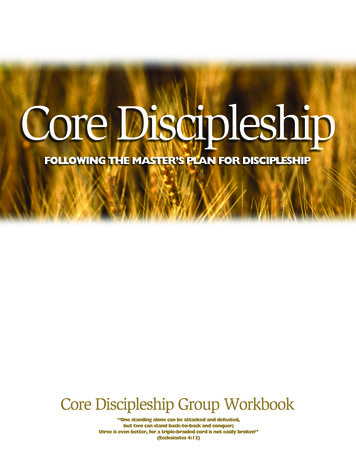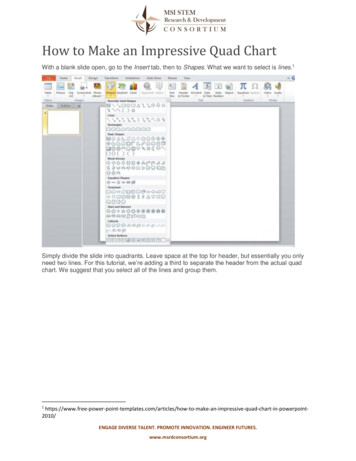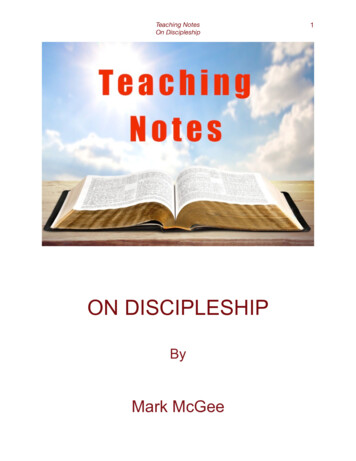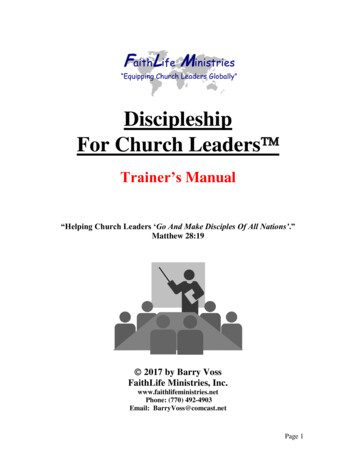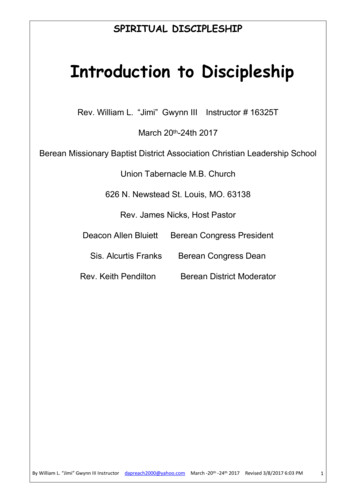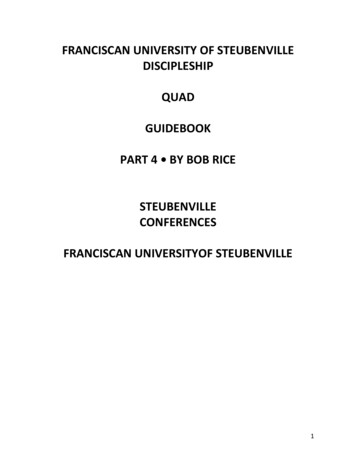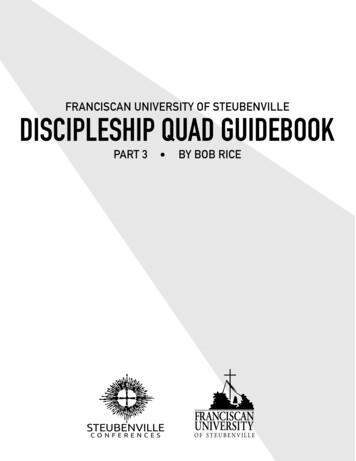
Transcription
About the Discipleship Quad GuidebookIn developing Discipleship Quads, Franciscan University of Steubenville saw a need for a Catholicdiscipleship curriculum that was specifically written for the Discipleship Quad process, andtherefore created the Discipleship Quad Guidebook. Dr. Bob Rice, professor of Catecheticsand director of the Masters of Arts in Catechetics and Evangelization at Franciscan Universityof Steubenville, is the primary writer. The Guidebook is also the fruit of the feedback andconsultation of many people who work in the field of discipleship, including the CatecheticalInstitute at Franciscan University.This resource is available for free to download on steubenvilleconferences.com and providesall that is needed to conduct Discipleship Quad gatherings. It guides a person through the variousaspects of being a disciple of Jesus in the Catholic Church today, giving specific attention to notonly gaining knowledge about being a disciple, but by challenging each person to actually growinto the disciple God created him or her to be, which includes actively sharing the faith and makingother disciples. The Discipleship Quad materials, including all support documents and content, is copyrighted by Bob Rice andFranciscan University of Steubenville, 2019. None of it may be reproduced in whole or in part in any manner,for sale or use outside of its intent, without the permission of the copyright owners. Copies can be made fordistribution and use by Discipleship Quad participants.
Table of ContentsCome, Holy Spirit!: Week 22 Lesson1Come, Holy Spirit!: Discipleship Quad Gathering Outline7Characteristics of a Disciple (Self-Assessment 2)9Our Blessed Mother: Week 23 Lesson15Discipleship in Action: A Scriptural Meditation on the Rosary21Our Blessed Mother: Discipleship Quad Gathering Outline23“You Shall Have No Other Gods but Me”: Week 24 Lesson“You Shall Have No Other Gods but Me”: Discipleship Quad Gathering OutlineA Good and Loving Father: Week 25 LessonA Good and Loving Father: Discipleship Quad Gathering Outline25333541Rotation of Facilitation43Living in Faith: Week 26 Lesson45Living in Faith: Discipleship Quad Gathering OutlineOvercoming Fear: Week 27 LessonOvercoming Fear: Discipleship Quad Gathering OutlineA Treasure to be Shared: Week 28 Lesson51535961Discipleship in Action: Proclaiming the Good News67A Treasure to be Shared: Discipleship Quad Gathering Outline71Eyes on the Prize: Week 29 Lesson73Going Deeper: Purgatory81Eyes on the Prize: Discipleship Quad Gathering Outline83Grace for the Mission: Week 30 Lesson85Reviewing the Commitment93Grace for the Mission: Discipleship Quad Gathering Outline95Christian Charity: Week 31 LessonChristian Charity: Discipleship Quad Gathering OutlineGrowing Deeper in Prayer: Week 32 Lesson97103105Discipleship in Action: Contemplative Prayer113Growing Deeper in Prayer: Discipleship Quad Gathering Outline115
WEEK 22Come, Holy Spirit!Main PointWe are transformed by the Holy Spirit to share God’s love with the world.Scripture to Memorize“If we live in the Spirit, let us also follow the Spirit.” – Galatians 5:25It is easy for us to imagine what Jesus might have looked like—a Jewish man in his 30s. Becauseof that, it can also be easy for us to have a mental image of God the Father—an older man inhis 60s, usually with a long white beard. However, when we talk about the Holy Spirit, ourimagination fails us. A dove? A tongue of fire? A dove on fire? None of these images really capturethe essence of who the Holy Spirit is. Like the Father and Son, the Holy Spirit is a Person wholoves you and wants a relationship with you.The word for “spirit” in Hebrew is ruah, which also means “breath” or “wind.” Both of these thingsare invisible to the eye. They are more felt than seen. In a similar way, though we can’t visualizethe Holy Spirit as well as the other Persons of the Trinity, we experience him in a profound way.The Holy Spirit at Work in UsOf all the Persons of the Trinity, the Holy Spirit is the most intimate with us. You have felt manymovements of the Spirit, you just might not have known it was him. St. Paul wrote, “No one cansay, ‘Jesus is Lord’ without the Holy Spirit.” Have you ever proclaimed Jesus as Lord? That was theHoly Spirit.The Catechism states that the Holy Spirit is present “in the scriptures he inspired” and “in thesacramental liturgy in which the Holy Spirit puts us into communion with Christ” (688). Haveyou felt the presence of God as you prayed with the scriptures or when you went to Mass? Thatwas the Holy Spirit.It goes on to state the Spirit is present “in prayer, wherein he intercedes for us.” As St. Paul wrote,“For we do not know how to pray as we ought, but the Spirit itself intercedes with inexpressiblegroanings” (Romans 8:26). Have you encountered God in prayer? You get the idea.Like the air we breathe, we are often not even aware of all the things the Holy Spirit is doing inour lives.The Mission of the Spirit“When the Father sends his Word, he always sends his Breath” (Catechism 689). This is abeautiful image of the distinct roles of each Person of the Trinity. The Father is the Creator.Jesus, the living Word, comes from the Father to redeem us. But one cannot have a word withoutbreath. That breath is the ruah, the Spirit, who sanctifies us.1
Here is a less beautiful image, but hopefully one that clarifies. If one was going to build a vacuumcleaner, a blueprint would be needed—that is the Father. He makes the plan. But you can’t cleana house with a blueprint. Someone has to put the pieces together. That is the work of the Son.So now you have a vacuum cleaner all built but it won’t work unless it is plugged in. It needspower. That is the Holy Spirit.In the synagogue, Jesus proclaimed the words of Isaiah: “The Spirit of the LORD God is uponme because the Lord has anointed me” (Luke 4:18). The anointing of Jesus (“Christ” means“Anointed”) was from the Holy Spirit. Though their roles are distinct, their mission is the same:“To be sure, it is Christ who is seen, the visible image of the invisible God, but it is the Spirit whoreveals him” (Catechism 689).Transformed by the SpiritA couple months ago, we reflected on how God does not desire us to be his creatures, but hischildren. We are adopted by the Father through the blood of Jesus Christ. Unlike adoptions today,where legal custody is granted through courts and paperwork, the Father adopted us by havingus be “born again.” He put the breath of his Spirit into our lungs.Scripture tells us that we have received “the first fruits of our inheritance” (Ephesians 1:14) in theHoly Spirit. The prodigal son asked for his inheritance early, and the father gave it to him. So alsodoes the Father generously give us our inheritance even before we die.We are no longer creatures of earth, but have been transformed into temples of the Holy Spirit.This is why when St. Paul chastised those in Corinth about their sexual immorality, he askedthem, “Do you not know that your body is a temple of the Holy Spirit within you, whom you havefrom God, and that you are not your own?” (1 Corinthians 6:19). Clearly they didn’t. Do we?Questions for Reflection1. What did you just learn about the Holy Spirit?2. How have you experienced the Holy Spirit in your life?2
Scripture ReadingAt the Last Supper, Jesus explained to the apostles, “I will not leave you orphans” (John 14:18)and that the Father would give them an “Advocate,” which means, “One who walks beside”: John15:18-16:15.Questions for Reflection3. Jesus said that it is better for us to have the Holy Spirit than to have him physically present(John 16:7)! How does that change how you think about the importance of the Holy Spirit?4. The Spirit convicts the world regarding both sin and righteousness. Have you felt the Spiritconvict you in these areas? (If you haven’t, ask the Spirit to reveal these things to you.)Faith into LifeIn the first chapter of the Book of Acts, Jesus ascends into heaven and tells the apostles, “You willreceive power when the Holy Spirit comes upon you, and you will be my witnesses in Jerusalem,throughout Judaea and Samaria, and to the ends of the earth” (Acts 1:8). And then they wentback into the upper room (the same room where the Last Supper was celebrated) and spent overa week in prayer.This is a moment worth reflecting on. The apostles had experienced everything they could aboutJesus. They knew him. They were “Jesus experts.” But that wasn’t enough for them to go out andtransform the world. They needed the Holy Spirit. It wasn’t until he came that the Church wasborn. This is what we celebrate on the feast of Pentecost, celebrated fifty days after Easter.3
Life in the SpiritLater in Acts, St. Paul comes across a group of disciples of Jesus who had been baptized by St.John the Baptist:He said to them, ‘Did you receive the Holy Spirit when you became believers?’ Theyanswered him, ‘We have never even heard that there is a Holy Spirit.’ When Paul laidhis hands on them, the Holy Spirit came upon them, and they spoke in tongues andprophesied (Acts 19:2, 6).I think the same question can be asked of us: Did we receive the Holy Spirit when we becamebelievers? In one sense, of course we did. In our baptism we were made temples of the Spirit.However, we can all receive a gift that we never use; we can “hold our breath.”Are we living a transformed life in the Holy Spirit, or do we just intellectually believe that Jesussaved us? The Letter of James makes it clear that intellectual belief is not enough: “You believethat God is one. You do well. Even the demons believe that and tremble” (James 2:19).Fruits of the SpiritHow can we know if we are living in the Spirit? We know by the same way you can tell if a treeis healthy: by its fruits. St. Paul compares those who live in the “flesh” with those who live in theSpirit:Now the works of the flesh are obvious: immorality, impurity, licentiousness, idolatry,sorcery, hatreds, rivalry, jealousy, outbursts of fury, acts of selfishness, dissensions,factions, occasions of envy, drinking bouts, orgies, and the like. I warn you, as I warnedyou before, that those who do such things will not inherit the kingdom of God. Incontrast, the fruit of the Spirit is love, joy, peace, patience, kindness, generosity,faithfulness, gentleness, self-control (Galatians 5:19-23).When the fruit of a tree is rotten, it is unlikely that there is something wrong with the branchfrom which the fruit hangs; it is probably a problem with the roots. This is why St. Paul prayedthat we would be “strengthened through his Spirit in the inner self,” so we would be “rooted andgrounded in love” (Ephesians 3:16-17). We need to draw life from the “living water” to bear goodfruit.The heart of life in the Spirit is being able to do the things of God and not be enslaved by sin:“Now the Lord is the Spirit, and where the Spirit of the Lord is, there is freedom” (2 Corinthians3:17). If you feel bound by any of the fruits of the flesh, the most effective prayer is, “Come, HolySpirit!”The Spirit of MoreIt was the Spirit that anointed Jesus for his mission of the salvation of our souls, and it is thesame Spirit that anoints us. This is why in the Sacrament of Confirmation a bishop, a successor ofthe apostles, lays his hands on us and anoints us as he says, “Be sealed with the gift of the HolySpirit.” The Catechism describes the effects of that sacrament in our lives:4
Confirmation perfects baptismal grace; it is the sacrament which gives the Holy Spirit inorder to root us more deeply in the divine filiation, incorporate us more firmly into Christ,strengthen our bond with the Church, associate us more closely with her mission, andhelp us bear witness to the Christian faith in words accompanied by deeds (1316).Rooted more deeply, incorporated more firmly, associated more closely you might notice theuse of the word “more.” For those who wonder why baptism isn’t enough, the answer is becausethe Holy Spirit wants to give us more!“And You Will be My Witnesses ”This “more” isn’t just for ourselves; it is to share with others. The Spirit gives in abundance, andwe have to share that living water, freedom, and new life. Evangelization, which means, “Toshare the Good News,” is the work of the Holy Spirit. We can share the message, but only theHoly Spirit can change hearts. He wants to use what he has given to us to do his work of leadingothers to proclaim that “Jesus is Lord.”If that makes you feel a bit afraid, remember that the apostles were afraid, too until theyreceived the Holy Spirit. They surrendered themselves to the Holy Spirit and the Spirit didamazing things through them. We don’t “use” the Spirit; we allow the Spirit to work in us. Weparticipate in his works, not the other way around.If you’ve been baptized and confirmed, you have this Spirit within you. You just need to startcalling upon him and surrendering to his will. This is how St. Paul encouraged St. Timothy:I remind you to stir into flame the gift of God that you have through the imposition of myhands. For God did not give us a spirit of cowardice but rather of power and love and selfcontrol. So do not be ashamed of your testimony to our Lord (2 Timothy 1:6-8).Questions for Reflection5. Of what fruits of the Spirit do you need more? At your next Quad gathering, those in yourQuad will pray for an outpouring of this fruit in your life.6. What emotions do you feel when you think about sharing your faith with others? How haveyou done this? With whom might the Spirit be leading you to share your faith next?5
Daily ReadingsThe coming of the Spirit at Pentecost: Acts 2:1-12Need for Baptism and Confirmation: Acts 8:14-17Spirit of adoption: Romans 8:1-17Many gifts, same Spirit: 1 Corinthians 12:1-13Sharing the faith: 2 Timothy 1:6-14Question for Reflection7. How has this lesson helped you fall more deeply in love with the Person of the Holy Spirit?6
Come, Holy Spirit!: Discipleship Quad Gathering OutlineOpening Prayer (three minutes)“God, thank you for the gift of the Holy Spirit. Help us today as we discuss the power of the HolySpirit and the fruits he wants to bear in our lives. We take a moment to give you all the things onour minds today and we ask you to help us enter into this time together.” (Take a quiet moment.)“Thank you for calling each of us here. Please bless our time today.”Recap of the Week (20-25 minutes)Each person shares a brief life update since the last gathering. This should be a practical, generalupdate on life, as well as an update on the spiritual life journey. The goal is to give a comprehensiveupdate by sharing for at least three minutes but no more than five minutes. Use the followingquestions to facilitate this time (use these only as a guide; the intent is not to answer all thesequestions): How have you been since our last gathering?How was your commitment to personal prayer time this week?What did you hear God saying to you or see God doing in your life this week?If it was a difficult week, what made it difficult?What are some blessings for which you are thankful this week?What would you like to do differently this week from last week?Last week we committed to one thing we could change or implement in our daily life to worktowards greater unity. How did that go?Reflection and Discussion (40 minutes)Note that the time is shorter this week in order to make more time for praying together during theResolution and Commitment section below:1. What did you just learn about the Holy Spirit?2. How have you experienced the Holy Spirit in your life?3. Jesus said that it is better for us to have the Holy Spirit than to have him physically present(John 16:7)! How does that change how you think about the importance of the Holy Spirit?4. The Spirit convicts the world regarding both sin and righteousness. Have you felt the Spiritconvict you in these areas? (If you haven’t, ask the Spirit to reveal these things to you.)5. Of what fruits of the Spirit do you need more? Share your answer, and then in the nextsection we will pray together.6. What emotions do you feel when you think about sharing your faith with others? How haveyou done this? With whom might the Spirit be leading you to share your faith next?7. How has this lesson helped you fall more deeply in love with the Person of the Holy Spirit?7
Resolution and Commitment (20 minutes)Note that there are 10-15 more minutes scheduled for this section this week. Read the followingreflection out loud:“This week we read that St. Paul encouraged St. Timothy with these words:‘I remind you to stir into flame the gift of God that you have through the imposition of myhands. For God did not give us a spirit of cowardice but rather of power and love and selfcontrol. So do not be ashamed of your testimony to our Lord’ (2 Timothy 1:6-8).For the last 20 minutes today, we are going to take some time to pray with each other for thefruits of the Spirit.”Details of Prayer Time: Take time to individually pray with each person in the Quad for the fruitsof the Spirit that each person wrote down in Question 5 above. When praying, if everyone iscomfortable with it, the three people praying with the one person may lay their hands on his orher shoulder or back during the time of prayer. Take turns leading the prayer for each person soeveryone gets a chance to lead. Begin with the Sign of the Cross. The person leading the prayershould ask for more of the Holy Spirit for the person (this could simply mean saying, “Come, HolySpirit”). Then you will specifically ask for the gifts that the person requested (ask each person tore-state what gifts they want to pray for right before beginning prayer). Feel free to use your ownwords of prayer for each person.The Resolution and Commitment this week is to continue to pray for the Holy Spirit to be stirredup in your life. This can simply mean saying, “Come, Holy Spirit,” at different moments throughoutthe day. Look for the fruits of the Spirit that you prayed for in your life this week and be ready todiscuss next week.Also, take some time this week to complete the Characteristics of a Disciple Self-Assessment 2 on thenext few pages. There will not be a Quad gathering specifically about this Self-Assessment (thoughthere will be for the third one), but we will have a few moments to share about it in your Recap nextweek. The goal of this Self-Assessment is for you to personally track your growth and next steps.Closing Prayer (three minutes)Close by offering up a general prayer for the Quad and praying for any particular intentions of theQuad.8
Characteristics of a Disciple:Self-Assessment 2It was about 10 weeks ago that you completed the Characteristics of a Disciple Self-Assessment1. At that point, you discussed your answers and next steps and goals with your DiscipleshipQuad. This time, we are offering the Self-Assessment 2 for your own personal reflection. Therewill not be a Quad gathering specifically to discuss your answers this time around. Though, inabout 10 more weeks, we will have a Quad gathering to discuss the Self-Assessment 3. The goalthis week is to read through the characteristics of a disciple, referencing your answers from Week13. Consider how you have grown and what further commitments you want to make in the areasof these characteristics of a disciple of Jesus. Remember, these self-assessments are here to helpyou to identify how you can work towards growth in each of these areas in your daily life andallow you the opportunity to make a practical goal for each one.Here is the description of a disciple we are using for this Discipleship Quad: A disciple is a personwho has responded to God’s grace of conversion, is committed to living a life of faith as taught to us byJesus, and is further committed to sharing their life of faith with others so as to equip them to go andmake other disciples. Therefore, we have identified the following core characteristics of being adisciple of Jesus:A disciple of Jesus Christ 1.2.3.4.5.6.7.Is rooted in the identity of being a son or daughter of GodHas an active, daily prayer lifeRegularly receives the sacramentsIs in fellowship with other disciplesDevotes his or her time to serving othersShares the Gospel with those around him or herIs obedient to what the Catholic Church teachesRead the following descriptions of each characteristic and answer the questions. Please be awarethat some of the topics associated with each characteristic have not yet been covered in theDiscipleship Quad Guidebook. All of the topics will eventually be covered.1. Is rooted in the identity of being a son or daughter of GodWe receive our identity as a son or daughter of God in our baptism. This is what roots us in thetruth of God’s personal love for us as his children. We are loved because we are his, not becauseof what we do or how we act. This truth builds the foundation for making major life decisions, ourvocation, and living our God-given purpose every day.9
How have you grown in your identity being rooted in being loved by God and not in what you do?What is your next step to grow in your identity as a son or daughter of God?2. Has an active, daily prayer lifeA disciple builds his or her relationship with the Father, Son, and Holy Spirit by regularlycommunicating with him in prayer. This includes daily personal prayer time, prayers of petition,praying with others, and traditional devotional prayers.How have you grown in your prayer life?What is your next step to grow in prayer?10
3. Regularly receives the sacramentsThe sacraments of the Catholic Church give the disciple the grace to live the Christian life. Adisciple makes frequent use of the sacraments and depends on the grace of a sacramental life.This includes all seven sacraments, with emphasis on the Eucharist and Reconciliation.How have you grown in living a sacramental life?How are you doing with attending Sunday Mass?When was the last time you went to the Sacrament of Reconciliation?Considering your answers above, what is your next step to grow in the sacramental life?4. Is in fellowship with other disciplesThe journey of a disciple is a journey that is intended to be done in community and fellowshipwith others. We are not meant to live the Christian life alone. This not only means beingsurrounded by others in a faith community, but also having frequent fellowship with a few11
close friends to help one another grow in a trusted and authentic friendship where Jesus is thefoundation and there is a mutual desire to help each other grow as disciples. The DiscipleshipQuad is intended to be a formative experience in fellowship. The fruits of meeting weekly withthree others for intentional fellowship is transformative and can very much meet the need forChristian fellowship and community.How have you grown in experiencing Christian fellowship and community?Considering that the commitment to this Discipleship Quad is a commitment to grow in fellowship,what is your next step to grow in cultivating frequent time in genuine Christian fellowship outside thisQuad?5. Devotes his or her time to serving othersBy following the example of Jesus, a disciple is called to serve those in need. This is done in theChurch community by giving of our time, talent, and treasure—especially to those who are poorand in need.How have you grown in serving the Church and those in need through your time, talents, and treasure?Keep in mind your service to your family and remember that our ministry needs to start in our homes.12
What is your next step to grow in service to others (including your family)?6. Shares the Gospel with those around him or herThe good news of the Gospel message of our salvation compels us to share it with others. As adisciple, we are called to share the Gospel by proclaiming God’s love in our everyday lives throughour actions and words.How have you grown in your comfort with sharing the Gospel (the Good News about Jesus) with peopleyou encounter in your life? How have you shared the Good News?What is your next step to grow in sharing the Gospel?7. Obedient to what the Catholic Church teachesGod has given us all we need to live in the truth of his love through what the Church has passeddown through tradition and Scripture. We are called to be obedient to these truths because Godknows that it will lead us to fullness of life. The first step to being obedient is knowing what andwhy we believe.13
How have you grown in your commitment level to what the Church teaches?What is your next step to grow in obedience to what the Church teaches?14
WEEK 23Our Blessed MotherMain PointTo Jesus, through Mary!Scripture to Memorize“His mother said to the servers, ‘Do whatever he tells you.’” – John 2:5Though I was born into a Catholic family, I spent many of my teenage years with EvangelicalChristians. They taught me to love Jesus and the scriptures, and I am so grateful for the impactthey had on my life. As mentioned earlier, Catholics have far more in common with our Protestantbrothers and sisters than not. However, one of the most significant differences is what we believeabout Mary, the mother of Jesus.My Protestant friends had questions about Mary, and at the time I didn’t have answers. Theythought devotion to Mary was unbiblical and even superstitious. Little did I know how groundedMarian devotion was in the Bible and in the life of the Church.Mary in Scripture and TraditionScripture reveals that it was through the “no” of a woman that sin came into the world. Is it notfitting that the “yes” of a woman would bring about salvation? St. Irenaeus wrote, “The knot ofEve’s disobedience was untied by Mary’s obedience: what the virgin Eve bound through herdisbelief, Mary loosened by her faith.”500 years before Jesus was born, Isaiah prophesied, “‘Behold, the virgin shall be with child andbear a son, and they shall name him Emmanuel,’ which means ‘God is with us’” (Matthew 1:23).The Gospel of Matthew begins with this prophecy, and the Gospel of Luke gives even moredetail about how an angel appeared to Mary, announcing that she was “full of grace” and thatshe, though a virgin, would give birth to the “Son of the Most High” (Luke 1:32). In Acts, St. Lukesays Mary was present when the Holy Spirit descended on the apostles and other believers atPentecost, showing her important role in the early Christian community.St. John also highlights Mary’s importance in both his gospel and in Revelation. He refers to heras “woman,” which is a direct reference to Eve, the first woman. In Revelation he has a visionof her “clothed with the sun, with the moon under her feet, and on her head a crown of twelvestars” (Revelation 12:1).Scripture lays the groundwork for understanding Mary’s role in our faith, but tradition buildsupon it. Like the sacraments and so many other doctrines of the faith, both tradition andScripture are needed to more fully understand the mystery. It is worth mentioning that devotionto Mary is not just a “Catholic thing.” Eastern Churches, Anglicans, and many other Christiangroups all venerate our Blessed Mother in different ways.15
Hail Mary, Full of Grace The prayer that we pray to her is mostly from Scripture. “Hail Mary, full of grace, the Lord is withyou” is Luke 1:28, the greeting of the angel Gabriel to her. “Blessed are you among women, andblessed is the fruit of your womb” is Luke 1:42, the words of Elizabeth when Mary came to seeher.The rest of the prayer comes from the teaching of the early Church. We call her, “Holy Mary,”because we believe she was conceived without sin, just as Eve was. This is known as theImmaculate Conception. However, unlike Eve, she accepted the will of God and remained withoutsin in her entire life. Since the flesh that the second Person of the Trinity would take would behers, it makes sense that it would be holy flesh. This is not to say she did not need Jesus for hersalvation—we all do! It was her faith in God and the Word becoming flesh in her very body thatpreserved her from sin. This is also why we believe she did not face death but was assumed intoheaven. (Jesus ascended into heaven, meaning that he went by his own power. Mary was assumedinto heaven, meaning that she was drawn to heaven, not by her own power, but by the powerof God.) As G.K. Chesterton said of her, she is “our tainted nature’s solitary boast.” She is holy,indeed!Mother of GodShe is also “Mother of God.” This phrase is more about the divinity of Christ than it is about ourBlessed Mother. As the Holy Spirit led the Church to more deeply understand who Jesus was, wealso learned more about the role of Mary: “What the Catholic faith believes about Mary is basedon what it believes about Christ, and what it teaches about Mary illumines in turn its faith inChrist” (Catechism 487).There was a heresy in the early Church that suggested that Jesus was not fully God and fully man,and suggested that Mary was only the mother of Jesus’ humanity. They wanted to divide Jesus intwo—part God, part man. The Church affirmed the unity of Jesus’ humanity and divinity. BecauseJesus is fully God, Mary is the Mother of God. This is not to put her above God, as if she createdGod before the beginning of time. Instead, it shows the humility and love that God has for us thatwould allow him to enter into our human experience, for we all have a mother, and now he does,as well!Mary, the Perfect DiscipleMary is the perfect example of what it means to be devoted to Jesus. What love is stronger thana mother’s love? Who knows a child better than his mom? The second Person of the Trinity choseto have a mother, and of all the people in human history he picked Mary. Of all humanity, she isthe only one who can claim to be a daughter of the Father, mother of the Son, and spouse of theHoly Spirit.We do not adore her as we adore God, but we give her the highest honor we can. Jesus gave hernot only the honor of being his Mother but crowed her Queen
Overcoming Fear: Discipleship Quad Gathering Outline A Treasure to be Shared: Week 28 Lesson Discipleship in Action: Proclaiming the Good News A Treasure to be Shared: Discipleship Quad Gathering Outline Eyes on the Prize: Week 29 Lesson Going Deeper: Purgatory Eyes on the Prize: Discipleship

